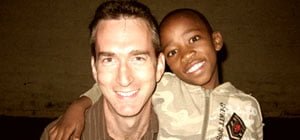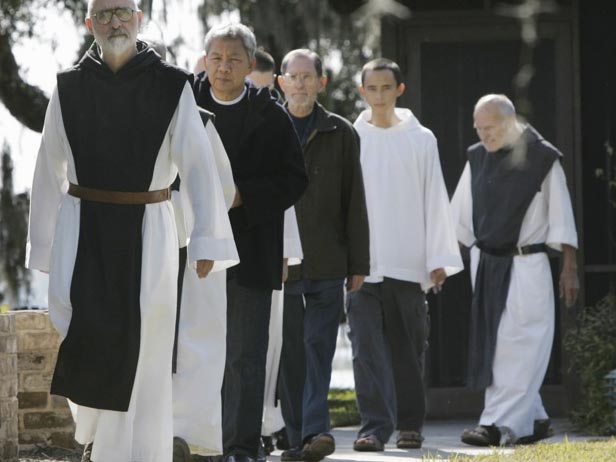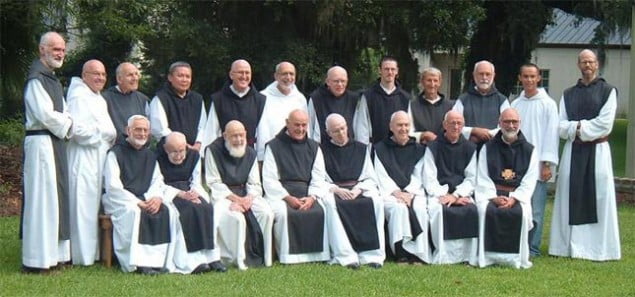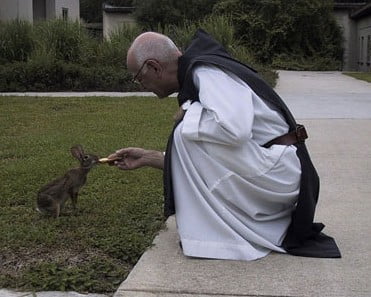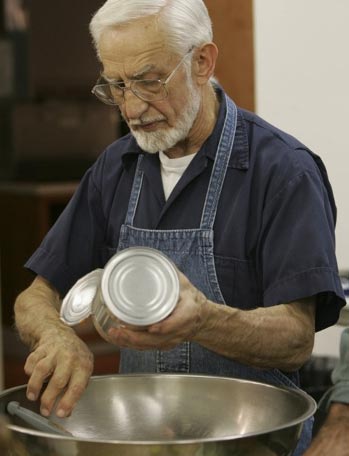This article depicts the success of the monks at a Trappist’s Monastery in South Carolina and gives us a peek in to the contributing factors of their successful monastery as well as their business ventures within their local community.
What makes it interesting are the foundation principles the author brings out which can be applied to our lives. If you have time to read it I think you’ll find it, as I did, chock full of lessons and quite inspiring. Whether you’re interested in spiritual principles or business success (or both), I think you’ll find some “secrets of success” in here.

Excerpts of a four-part series by August Turak, Forbes, April 2009
For more than 12 years I have been going to a Trappist monastery in Moncks Corner, S.C., called Mepkin Abbey. As a monastic guest, I wear a habit and temporarily live the life of a Trappist monk. I go primarily for spiritual reasons, but as a businessman and entrepreneur I am fascinated by the worldly aspect of the monastic life.
Mepkin, like monasteries the world over, runs a business. These monastic businesses are invariably based on just the kind of low-margin, highly competitive commodities—cheese, fruitcakes, eggs—that any first year MBA student would “wind down” and “exit” as fast as possible.
Yet these monastic businesses are hugely successful. The demand for their prosaic products far outstrips supply, giving monastic businesses the kind of pricing flexibility usually associated with dominant brands or patent protection.
Most important, the monastic business model is far more than a curious anomaly. My own experience applying the monks’ lessons demonstrates that the magic behind monastic businesses can be universally applied with equally impressive results. Business executives everywhere should be learning from the monks.
First, some background. An essential part of the Rule of St. Benedict, the founding and still-definitive guide to monasticism written by St. Benedict in the sixth century, is that all monasteries must be self-sufficient and self-supporting communities. Trappists accomplish this primarily through manual labor. Indeed, the Rule of St. Benedict calls monks to manual labor as an essential part of the monastic experience.
Orare est laborare—to pray is to work—is a principle that new monks quickly learn at Mepkin.
 Mepkin Abbey has several thousand acres of woods, pastures, gardens and forests. Until recently, the monks ran an egg business with 40,000 chickens; they recently transitioned into the mushroom business. The manure from chickens is collected, processed, bagged and sold as compost, and the trees that cover much of the monastery are managed as a renewable forest.
Mepkin Abbey has several thousand acres of woods, pastures, gardens and forests. Until recently, the monks ran an egg business with 40,000 chickens; they recently transitioned into the mushroom business. The manure from chickens is collected, processed, bagged and sold as compost, and the trees that cover much of the monastery are managed as a renewable forest.
The land, a gift from the family of the publisher Henry Luce and his wife, Clare Booth Luce, back in the 1940s, came with a magnificent garden along the Cooper River that the monks meticulously maintain. The Abbey has a beautiful church, a wonderful library, a conference center, a guest center, a gift shop and more than a dozen immaculate secretreat houses. The monks entertain a constant stream of retreatants, guests and sightseers while cooking for themselves and caring for their aged and infirm in a spotless state-of-the-art infirmary.
 Impressive as this sounds, what is most amazing is that all these accomplishments represent the part-time effort of a couple of dozen elderly men living and working together mostly in silence. They attend church services six times a day and spend hours in solitary prayer, contemplation and sacred reading. Because their mission is to live a life of silent contemplative prayer, they work only part time.
Impressive as this sounds, what is most amazing is that all these accomplishments represent the part-time effort of a couple of dozen elderly men living and working together mostly in silence. They attend church services six times a day and spend hours in solitary prayer, contemplation and sacred reading. Because their mission is to live a life of silent contemplative prayer, they work only part time.
All too often our organizations fail to reach their potential because people spend too much time looking over their shoulders. What is so striking about Mepkin is that the monks are never looking over their shoulders. They are passionately committed and totally focused on the task at hand, and they know that their brothers are doing the same. As a result, they are highly efficient and get an enormous amount done in the four hours a day they dedicate to earning their living.
Yet if we allow ourselves to be impressed by the monks because they manage to accomplish so much despite their single-minded dedication to their mission, we make a common but cardinal error. It is because of their focus on mission that they operate a multimillion-dollar business with a degree of frictionless efficiency that would drive most profit-driven executives to distraction with envy. And if we are willing to learn from the monks, our secular corporations can do the same.
Service and Selflessness. What we must learn from the monks is a management philosophy that I call “service and selflessness.” It has seven basic aspects.
The first aspect of service and selflessness is having a high overarching mission worthy of being served.
The second principle is selflessness. At Mepkin the mission is so noble, well articulated and continually inculcated that the monks are inspired to focus on it selflessly.
The third element of service and selflessness is a commitment to excellence: At Mepkin Abbey every single egg is packed with a “prayerful attitude.”
The fourth principle is a ruthless dedication to the highest ethical standards.
The fifth secret is faith. Every day, regardless of booms and busts in the larger economy, the monks risk their lives and livelihood faithfully serving their principles while trusting that business will take care of itself.
The sixth aspect of service and selflessness is trust. The monks continually amass and replenish their treasury with the most valuable capital that any individual, product or business can possess: trust.
The seventh and perhaps most important secret to service and selflessness is living the life. Service and selflessness are just words on a page without a rigorous methodology for constantly reinforcing these principles, right down to the last egg. And, as luck would have it, the monks have a 1,500-year-old method called the Rule of St. Benedict that supplies just that.
Having a high overarching mission worthy of being served.
Every monastery begins with the highest goal possible: Serve God. This mission is clearly and unambiguously articulated, and anyone joining the monastery clearly understands this coming in.
Perhaps the most critical executive task for any organization is to continually ask, “What is the business of the business?” And everyone remotely connected with the business must be involved in the answer. Only by continually asking this question and coming up with the highest answers do we keep from defining the business too narrowly. It is this constant exercise that keeps us from defining the business as buggy whips when everyone is buying automobiles.
In my consulting business I continually meet with the objection that mission statements emerging from this exercise are all motherhood and fluff. Most corporations are in niche markets with niche products, and high overarching missions strike many as too soft and abstract. Besides, missions that are too high lead to a lack of focus.
Yet I can think of no business mission more lofty, soft and abstract than serving God, and monasteries manage to successfully infuse this lofty mission into a panoply of niche products and mundane tasks with the kind of focus that leads to almost supernatural results.
The reason why so many corporate mission statements seem vague and irrelevant, and fail to inspire, is not because they are too lofty or too abstract. It is because the executives tasked with translating the mission into execution lack the commitment and imagination to make the thousands of mundane connections between mission and execution that are necessary for success. Defining mission and infusing it into decision making is not the province of a yearly management retreat. It is a daily imperative that is the single most important priority any organization must have. And it is just as dependent on the folks in the mailroom as it is on the executive suite.
 The secret to Mepkin Abbey is that the monks are not in the egg, mushroom, fertilizer or forestry business. Like archers, they aim past all these targets. They are in the business of serving God by serving one another and their neighbors. They are spiritual people who happen to run businesses; they are not profit-driven people who happen to have a sideline interest in service for public relations purposes.
The secret to Mepkin Abbey is that the monks are not in the egg, mushroom, fertilizer or forestry business. Like archers, they aim past all these targets. They are in the business of serving God by serving one another and their neighbors. They are spiritual people who happen to run businesses; they are not profit-driven people who happen to have a sideline interest in service for public relations purposes.
This radical reorientation of priorities is essential. It is so counterintuitive that it is the most amazing example of outside-the-box thinking I’ve ever encountered.
Charity, or what in its much larger sense the monks call caritas, means living from the heart. Living from the heart begins with a change of heart, and this transformational change of heart is what men join the monastery to find and what the monastic life provides. Caritas is not something the monks practice part time for some future merit in the afterlife. It is the driving force behind everything they do.
For the rest of us, as corporate citizens, charity is a wonderful thing, but we lack the imagination and the courage to put it at the center of our business endeavors, despite the evidence of a 1,500-year-old monastic experiment to the contrary.
Secret 2: Selflessness.
On my first visit to Mepkin Abbey, I found myself in the lunch line behind a frail monk clearly well into his 80s. As he slowly and painfully stooped for one of the trays stacked knee-high beneath the counter, I was busy stifling my impatience until he suddenly presented me with his hard-earned tray, with a look of childlike delight.
Over the next several days I experienced so many simple acts of kindness that I found it confrontational. It wasn’t just the kindness in itself, but the natural, unthinking and effortless way this kindness permeated the monastery. Before I knew it, I was visiting more often, staying longer, volunteering for extra work, and giving away meal trays as fast as I could.
The monk’s commitment to selfless service was so contagious that I couldn’t help myself. The atmosphere was so transformative that I was transformed without any conscious effort on my part.
Much of Mepkin Abbey’s business success is based on the radical notion that the purpose of the individual is to serve the community, not the other way around.
One day Father Guerric, an urbane and sophisticated former parish priest, told me that when he first came to the monastery he wanted to make high-end vinegars for Mepkin to sell. However, when he presented his idea to the abbot at their first meeting, Father Francis said, “That’s a great idea. But what we really need is an infirmarian.”
“So off to school I went, and now I change bedpans,” Father Guerric said, with a gentle smile. “I came here to serve God by serving others, not to play Farmer John. I should have walked in there and just asked Francis how I could help. Even after all this time I’m still ashamed of myself.”
While it may seem that we want an easy life of self-indulgence and immediate gratification, if we look a little closer I think we would all admit that we are most satisfied when we are sacrificing in the service of something eminently worthwhile. In fact, I would argue that it is the dead end of self-indulgence and our failure to create missions worth sacrificing for that has led to the epidemic of depression afflicting the Western world today.
As a sales executive for many years, I spent much of my time on the problem of human motivation. I tried all the traditional techniques, like recognition and reward, with pedestrian results, until I finally stumbled on the answer: Maximum motivation emerges from the peer pressure of a team working toward a common mission.
It was only when I realized that we, like the Marine Corps, will do things for our buddies and the Corps that we would never do for ourselves that we saw the results we were looking for. I stopped managing people and started managing culture. When I did, revenue took care of itself, just like at Mepkin.
Throughout my career I’ve listened as executives bemoaned shortages of talent in the workplace and the difficulty and cost involved in attracting and keeping talent. Talent is not in short supply. What is missing is the matrix of overarching values that inspire ordinary people to extraordinary results.
Father Malachy was a monk in his 80s who worked with me in the monastery grading house. Day after day he unfolded and stacked the cardboard crates for the egg cartons I was busily packing. As we became friendly, I saw only a simple man and simple monk engaged in a simple task.
One day Malachy told me that the abbot had once asked him to write summaries in English on 50 theological books written in French that someone had donated to the monastery.
“Well,” Father Malachy said softly, “Francis thought I spoke French, but I didn’t. But he was so busy I didn’t mention it. I just stayed up late for a few months and taught myself French. Then I read the books and wrote the summaries.”
Then he humbly returned to his boxes, leaving me dumbstruck with envy and abject awe. To this day, every time I’m tempted to slack off at Mepkin I think of Father Malachy and redouble my efforts instead.
Superhuman performance flowing effortlessly from selfless service is not a rarity at Mepkin.
It is pervasive, and it comes from an inspirational value system that powers a whole that is so much more than its individual parts.
Louis R. Mobley, the founder of the IBM Executive School and my mentor, used to say, “The task of management is to create superior organizations by getting extraordinary results from ordinary people.” And I’ve never seen it done better than at Mepkin Abbey.
The business success of Mepkin Abbey depends on its reputation for providing only products of the highest quality. For weeks on end I’ve worked the “round table,” the last step in the grading process, stuffing cartons of eggs into Father Malachy’s boxes.
Every once in a while, Father Stan, Mepkin’s business manager, will wander by and gently remind me that I am the last bastion of quality control before the eggs go off to market, and I don’t think I’ve ever taken a job more seriously.
At every stage of Mepkin’s business, quality is paramount, and a prayerful attitude prevails not only in the egg house but in the way the food is prepared, the laundry washed and the guest houses cleaned and prepared for the next sojourning retreat.
But even though anyone on the line can shut down the egg conveyor in the grading house if quality is threatened, product quality is not the point. Mepkin’s fanatical commitment to quality is just the byproduct of living life with a prayerful attitude. Excellence for the sake of excellence is what really motivates the monks and drives their monastic business.
This attitude does not have to be unique to men who see every action as an offering to God. We all seek the peace and quiet satisfaction that comes from a job well done—not only in our professional lives but in our personal lives as well. Once again, what is usually missing is a mission that inspires meticulous concentration on the task at hand.
All too often we feel haunted by a sense that what we are doing has no greater point and no higher meaning, and this leads to a cynical “That’s good enough,” “What’s the point?” or “What does it matter?”
It is only when we feel we’re part of something bigger and eminently worthwhile that the most mundane tasks, like packing eggs, take on cosmic significance, and the customer gets the crack-free eggs he deserves.
Secret 4: Ethical Standards.
 Besides selling eggs at the guest center, Mepkin distributes them through a number of local grocery chains. One day I was making deliveries with Father Stan when I heard one of his buyers offer to sell Mepkin’s eggs at a premium price.
Besides selling eggs at the guest center, Mepkin distributes them through a number of local grocery chains. One day I was making deliveries with Father Stan when I heard one of his buyers offer to sell Mepkin’s eggs at a premium price.
Stan thanked him for his kindness but said that an “egg is an egg,” and the brothers couldn’t in good conscience sell their eggs for more than the prevailing price.
The buyer was amazed, and so was I. Never in my business career had one of my distributors ever pleaded for a higher price.
Although this action was injurious to Mepkin’s bottom line in the short run, in the long run it was beneficial. Despite his exasperation, I could see that the buyer was impressed, and no business has ever had a better and more loyal distribution system than Mepkin Abbey. Again and again I’ve seen grocers, caterers and bakers go the extra mile to make sure that Mepkin’s eggs have a market.
A reputation for honesty and integrity is one of those “intangible assets” that pay off in ways we can never fully anticipate. It is Mepkin’s commitment to its core principles that makes ethical decisions easy even when the pressure is on.
While we often think that unethical behavior is the result of bad people doing bad things, actually it usually comes from good people doing bad things, out of fear and insecurity. At Mepkin the monks are rooted in a tradition that transcends the kind of egotistic identification that so often leads to unethical behavior under pressure.
Knowing who we are and what we stand for is the critical component in maintaining the highest ethical ideals.
Secret 5: Faith.
Francis Kline, the former abbot of Mepkin, was one of the most remarkable leaders I’ve ever known. A Juilliard-trained organist, he walked away from a contract with a major recording label in his early 20s to join the monastery.
Fluent in several languages, he wrote music and books, was passionate about art, architecture and environmental issues, and in his spare time managed to find the money to completely rebuild the monastery. Yet, as he often said, nothing was more important than his prayer life.
One day I asked him how he and Mepkin managed to get so much accomplished with so few resources. He smiled and said, “We just trust the process. This is a 1,500-year tradition, and we trust the process.”
Mepkin’s success comes from faith. Not just the kind of faith we usually associate with theological beliefs, but the kind of faith that is implicit in the word faithful. The monks faithfully behave in a way that may not seem entirely rational to the casual observer or even at times to themselves.
Jesus said that if we seek first the kingdom of God, everything else will take care of itself, and that is the kind of faith that drives Mepkin. In a wider sense, the monks attack each and every day with the faith that if they “live the life” of service and selflessness, the necessities of life will somehow be provided.
This way of life is not limited to monasteries, Christians or even believers. The old adage that good things happen to good people is true, and in my own business life I’ve seen it pay off in magical ways. However, the trick that the monks have mastered is that this secret cannot be manipulated. Our faithfulness must be authentic, and our motives pure, if we are to pass the tests of daily life. Paradoxically, it is only when we no longer care about “what’s in it for me” that the formula works.
Over the years, I’ve watched in awe as people from all over the world, from all walks of life, believers and atheists, step forward to help the monks live out their mission. The brothers never ask for this help, yet it seems to flow effortlessly. The secret to Mepkin’s business success is that through faithfulness the monks have learned how to let success happen.
Mepkin’s mood of higher purpose is so seductive that people step forward to help and go away feeling as if they got the better part of the bargain. There is no reason why our corporate customers, vendors and colleagues can’t feel the same way.
Faith at Mepkin is not just about theology. It means faithfully living out the mission regardless of where it leads and how scary things get.
One day I asked a new monk, a comparative youngster of about 50, why he had joined the monastery.
“I almost didn’t,” he replied. “I was meeting with Father Stan, and I said, ‘If I join and take care of all these old men, who’s going to take care of me?’ “’I don’t know,’ Stan replied. ‘All I know for sure is that I’ll be here.’ I was so moved by his answer that I signed up on the spot.”
Father Stan’s answer and this new monk’s reaction is the kind of faith that Mepkin is built on, and it has been critical to Mepkin’s business success, as well as to my own.
Secret 6: Trust.
 Sooner or later every manager realizes that 99% of the people he depends on for his success don’t report to him. Real leadership is built on persuasion, and persuasion is built on trust.
Sooner or later every manager realizes that 99% of the people he depends on for his success don’t report to him. Real leadership is built on persuasion, and persuasion is built on trust.
I was once brought in to turn around sales for a large company. The company was running at a loss, and this had led to the most vicious interdepartmental infighting I’ve ever seen. Everyone reporting to me from executive to assistant expected me to take up cudgels and champion sales, but instead I bought some time with some diplomatic comments, closed my door and did some hard thinking.
I knew I had to do something fast, but what? I felt overwhelmed, until I finally asked myself what a service-and-selflessness response to my predicament might be. Then I picked up the phone and asked each of the other executives for an appointment, carefully making it clear that the meeting would take place in their offices, on their turf.
When I arrived with my pencil and notebook, I was greeted universally with folded arms and barely concealed hostility. Taking a seat, I leaned forward and gently said, “I’m here to find out what sales can do to make your life easier.”
It took a while for the shock to fade from their faces, but eventually they were rattling off suggestions as I scribbled them down. When we finished, I thanked them for their time and left without mentioning my own problems.
Then I gathered my department and said my immediate priority was convincing the company that our only interest was in serving the overall mission. I told them we would have to prove it by getting our own house in order first. This, of course, was not what they wanted to hear, and for a few moments everyone just sat there shell-shocked. I then made a personal appeal for their trust, and they agreed to go along.
It took a week or so, but when the other departments saw that I was implementing their suggestions and asking for nothing in return, one by one they stopped by and asked me how they could reciprocate. Little by little, mutual trust was established, and I went from feeling powerless to feeling that I had more than enough influence to accomplish my goals. Four months later, sales had tripled, we were all socializing together and, incidentally, I was making more money than I had ever dreamed of.
Did I know going in that things would turn out as they did? No. I was scared to death. But as Father Francis said, I knew I had to trust the process.
This experience taught me how to be what I later came to call a corporate statesman. A corporate statesman puts the interest of the whole before his own and trusts others to follow his lead.
Trust is the most powerful tool an executive or organization can have, and that trust is directly proportional to selflessness. If I had been trying to game my colleagues, they would have seen through it immediately, with disastrous results. Everything hinged on my willingness to subsume my selfish interests and sincerely put the company’s mission and the interests of others first.
Trust is critical to Mepkin Abbey’s success. One day I was stopped for speeding at a notorious speed trap about 100 miles from Mepkin. I went to see the judge and told him I had not been speeding. When he found out I had been on my way to Mepkin, he said, “Well, if you were going to Mepkin and you say you weren’t speeding, then you weren’t speeding.” He dismissed the case.
Mepkin’s customers trust its products. Mepkin’s suppliers trust its invoices. Mepkin’s volunteers know they are contributing to a good cause. And Mepkin’s trust bled into my speeding ticket 100 miles from the monastery.
Trust is the most powerful form of capital there is, and nothing makes a business run more smoothly than trust. In addition, trust is not a scarce commodity and, like Mepkin, we can all have more of it than we actually need.
However, trust is also fragile. Once squandered, it may be impossible to regain. Trust begins with the kind of faith outlined above. Faith provides the courage to go first and offer our own trust before we are sure it will be reciprocated.
This is the scary part of authentic trust, and authentic trust is what Mepkin offers every day. There are no locks at Mepkin, and yes, once in a while things are stolen, but in the long run the trusting attitude symbolized by this lock-free environment has paid Mepkin back hundreds of times over.
Secret 7: Living the Life.
 The final secret to Mepkin Abbey’s business success is the Rule of St. Benedict.
The final secret to Mepkin Abbey’s business success is the Rule of St. Benedict.
The Rule is a living document used daily to foster, nurture and inculcate the values outlined above into the life of the monastery. Every monk at Mepkin goes through a long process of training called “formation.” They enter as postulants, become novices, take their simple vows and eventually take their solemn vows. Throughout this process their progress is monitored by a novice master and the abbot.
A monk’s formation is not limited to training sessions and inspirational speeches. Formation is a continuous process of peer-to-peer coaching and acculturation designed to make the unnatural values of the monastic life so habitual that they become second nature. This process is primarily bottom-up, and the novice often finds the peer pressure for service and selflessness confrontational.
“When people come here all they see is peace and tranquility,” a novice once told me, “but it is actually so intense. Every time I think I’m making progress I catch myself shoving some old monk out of the way so I can get that last dish of ice cream. These guys are living witnesses to how selfish I really am, and there’s no place to hide.”
Transforming ourselves and our organizations is not an easy task, and it invariably leads to a few dark nights of the soul when we realize that we cannot do it on the cheap. The benefits are breathtaking, but the level of commitment required to change habitual thinking is daunting as well.
Louis Mobley told me that he was failing as director of the IBM Executive School back in 1956 until he discovered that leadership and healthy organizations depend not on skills and knowledge but on values and attitudes. And the corollary to this discovery was that values and attitudes cannot be changed by traditional teaching techniques like reading and lecturing. Values and attitudes change slowly, based on experience.
Mobley scrapped the lecterns and turned the IBM Executive School into 12 weeks of intensive experiential learning, built around values and followed with on-the-job coaching. And for many subsequent years, IBM was cited as the best place to work in the world.
If we want to introduce the magic of service and selflessness into our corporate business model, we must change the daily experience of the workplace. We need corporate missions every bit as powerful as Mepkin’s, and the kind of culture that lives this mission every day. We must create our own process of “formation.”
We need novice masters who understand that changing the culture is critically important, and we must get the arrows of peer pressure pointing in the right direction. Above all, we need the faith to begin, the courage to continue and the trust that everything will turn out as it should.
Conclusion.
According to his new biography, Snowball: Warren Buffett and the Business of Life, the legendary investor attributes much of his success to the writings of Dale Carnegie. But the secret is not in Carnegie’s book but in Buffett’s willingness to take his message to heart.
“Unlike most people who read Carnegie’s book and thought, ‘gee, that makes sense,’ then set the book aside and forgot about it, Warren worked at this project with unusual concentration,” his biographer, Alice Schroeder, writes.
“He kept coming back to these ideas and using them. Even when he failed and forgot and went long stretches without applying himself to the system, he returned and resumed practicing in the end.”
Even the greatest ideas eventually come down to personal accountability, and even the monks of Mepkin Abbey occasionally, and with profound sadness, must ask one of their brethren to leave. Service and selflessness starts with holding ourselves accountable, and one of the biggest mistakes we can make is assuming that our own transformation depends on the other guy, whether that other guy is in the next cubicle or the corner office.
Samuel Johnson observed that common sense is the only thing in oversupply, since everyone assumes they have more than they need. Service and selflessness starts with the humility that knows we all could be doing more.
You can start amassing your treasury of trust today by acting at all times like a corporate statesman. You can go first, offer trust before it is offered, and take a sincere interest in somebody else. Do just one task today with a prayerful attitude and see how it feels. Thank someone, do it now, do it in writing and copy the boss. If credit comes, give it away and try not to worry about whether anyone noticed. Praise in public, and if it is absolutely necessary, criticize only in private.
Longer term, watch your inner motivations. The poet T. S. Eliot defined life as “one long purification of motive.” Take a daily inventory, and learn how to short-circuit fear and selfishness before they warp your better judgment. With the diligence of a monk, over time you will become a go-to guy, the person others turn to for advice because they know he will never use their confidence against them.
And when this day comes, you will find that the material rewards that inevitably come from this transformation don’t seem to matter as much. Like the monks at Mepkin, material rewards will become the ancillary yardsticks of a life well lived. As Aristotle taught us, virtue will be its own reward. You will wonder why that took so long to figure out.
But when you’re tired and discouraged in the meantime, wondering as you will about the fruits of all your labor, remember that the monks of Mepkin are rooting for you. I know. I’ve heard them say the prayer.
August Turak is an entrepreneur, consultant, writer and speaker who divides his time between New York City and his farm in North Carolina. His writings include “Brother John,” winner of the John Templeton Foundation’s Power of Purpose Essay Contest, also inspired by his experiences at Mepkin Abbey.
